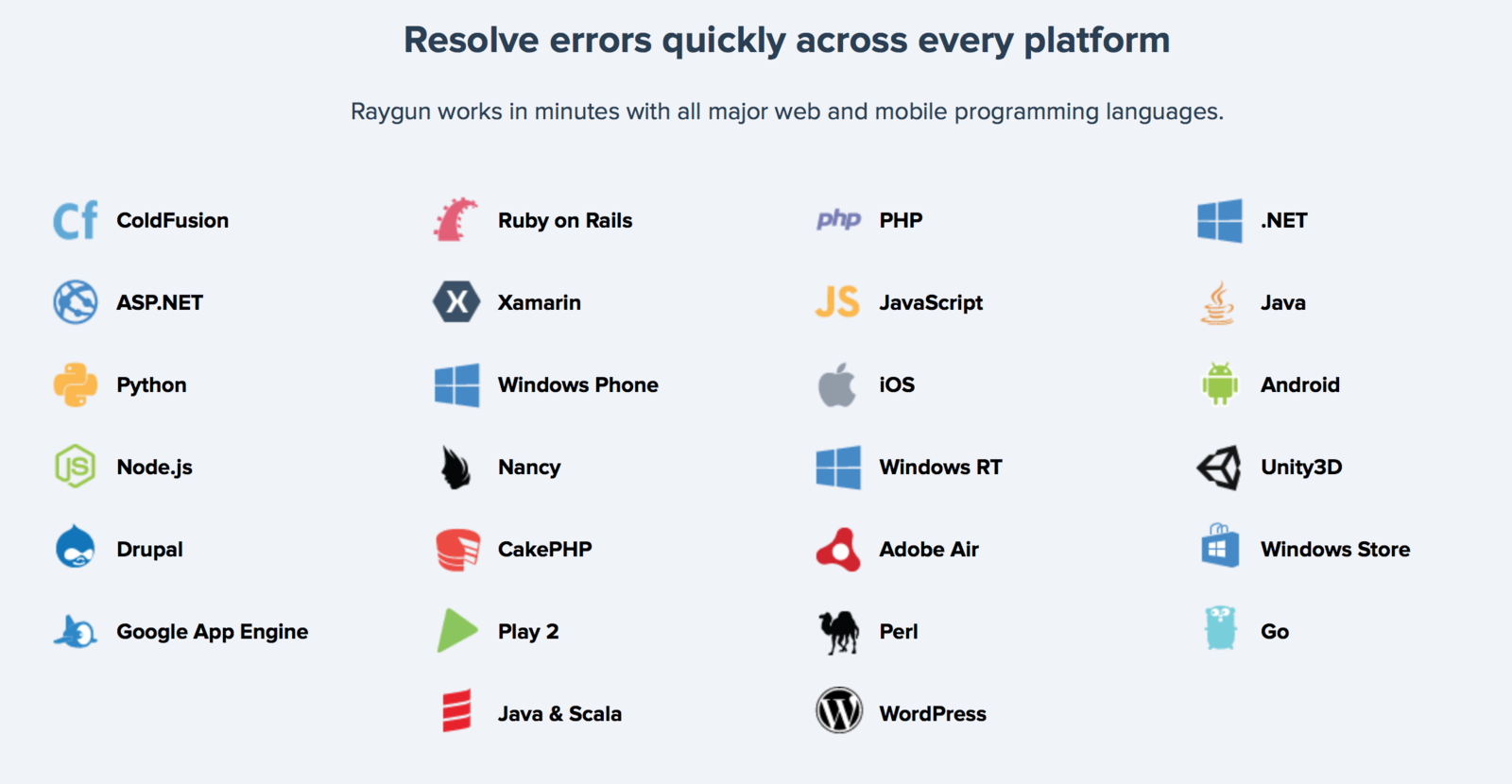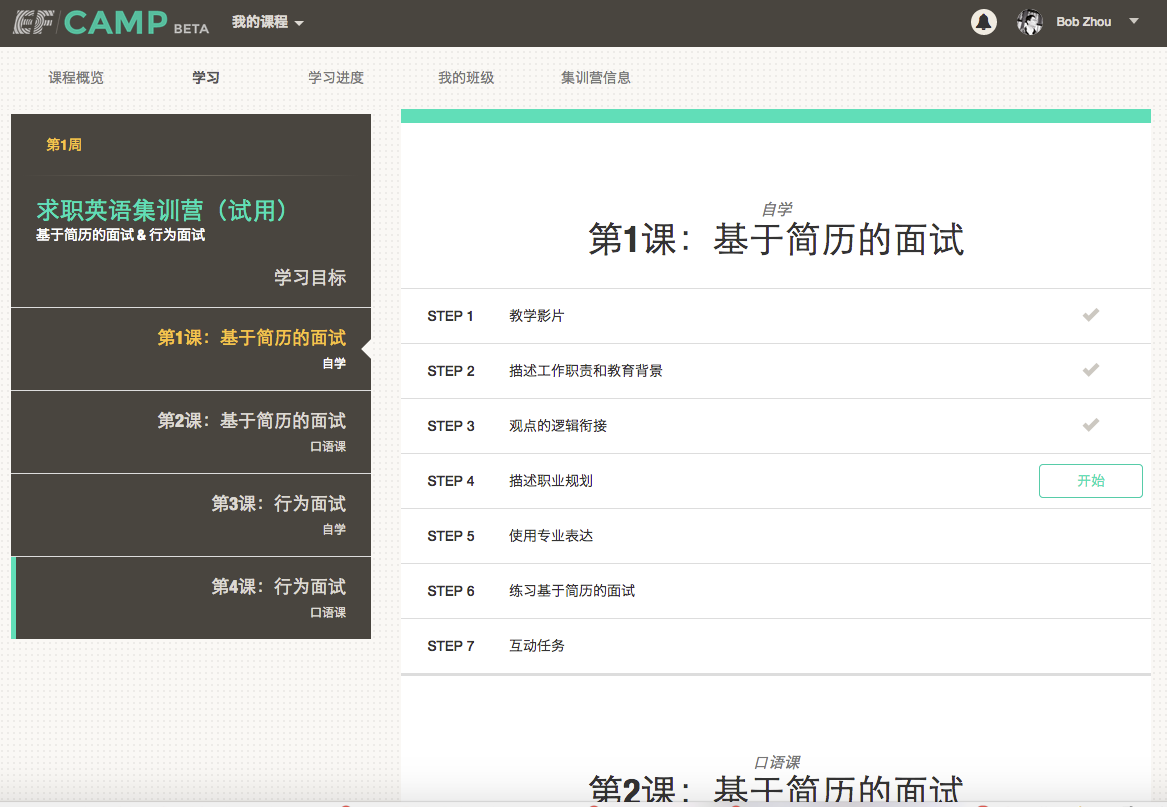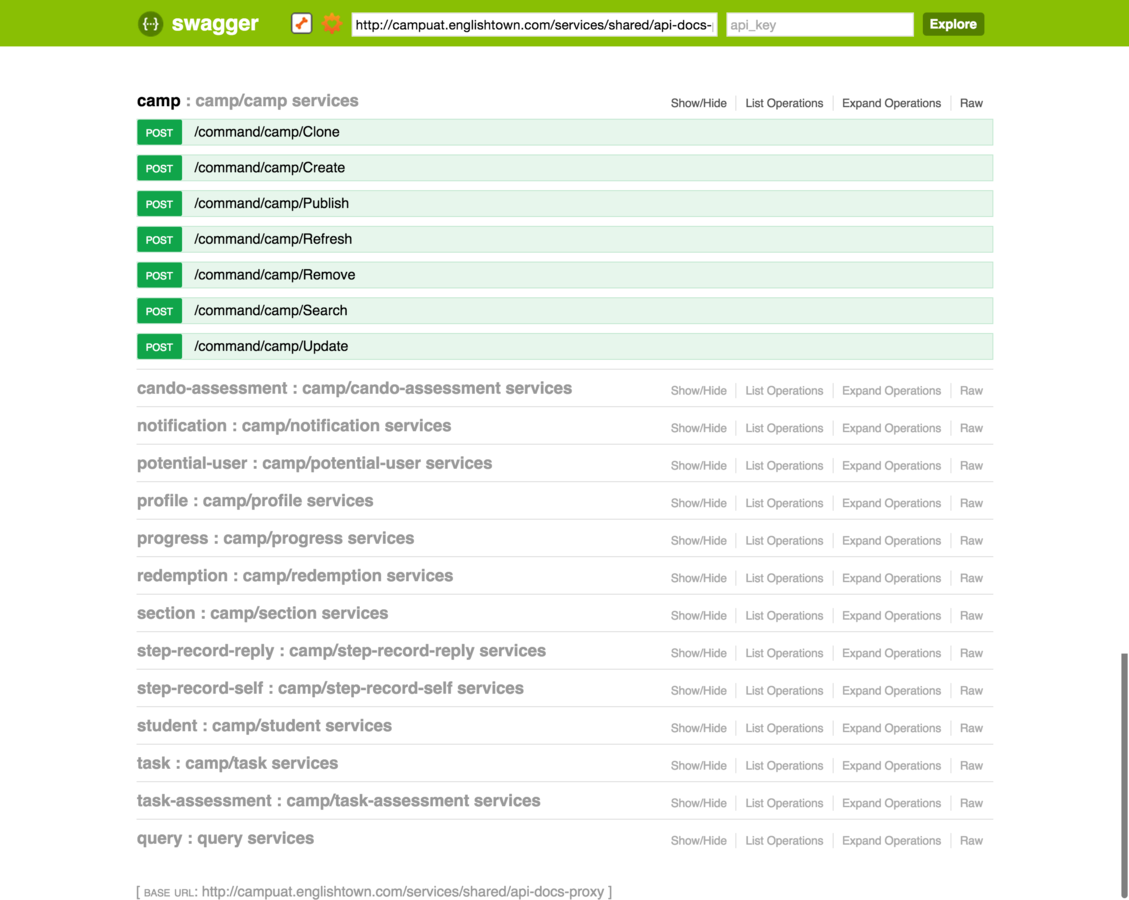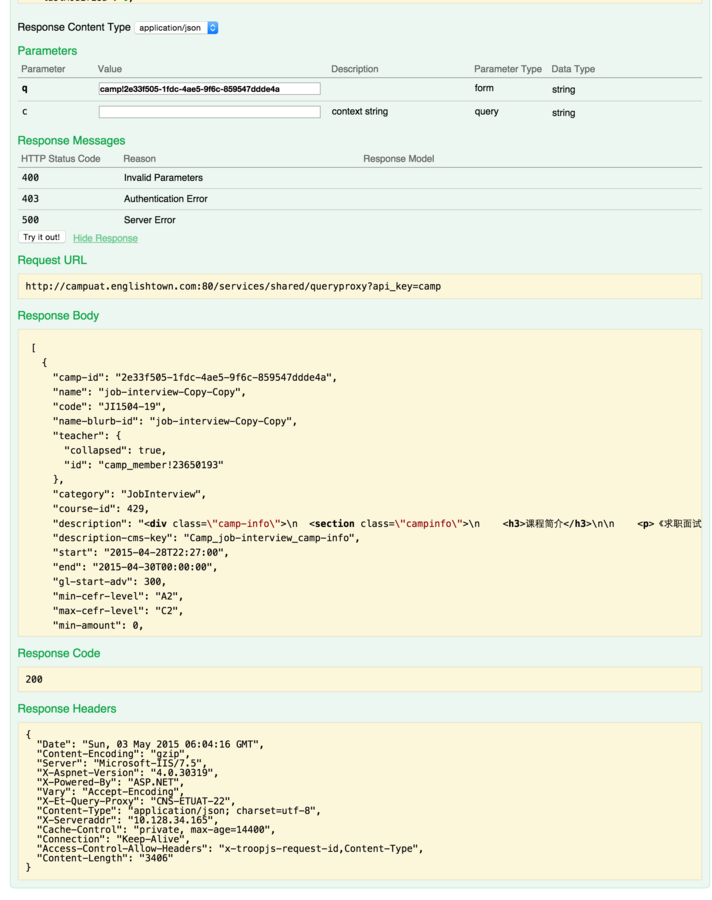CAMP Tech Crunch
@CAMP dev team
Goals
- Build on top of Englishtown
- Highly performant
- Scales horizontally (students from cross CN and US)
- Scales proportionally (huge class)
- Appealing interaction/modern look & feel
- Responsive all the way down to mobile
- Ship fast - prototype in 2m, production in 6m
Feature Highlights
- topic-oriented platform
- timeline-based class composer
- social recording
- self-enroll courses
- mobile usabilites
- real-time notifications
Facts
- Limited dev resources (3 ppls, 8 month, 100k LOC)
- Skinny team setup: QA(intern) Design(part time)
- New DB (Cassandra)
- Unstable Framework (TroopJS)
- Aggressive PO (Bob)
Stats: front-end
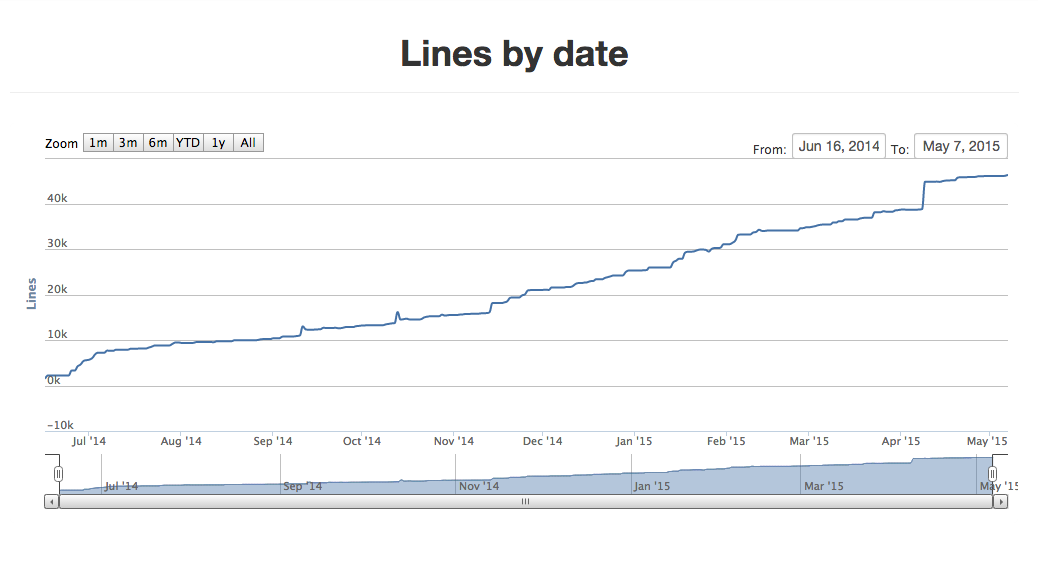
Stats: front-end
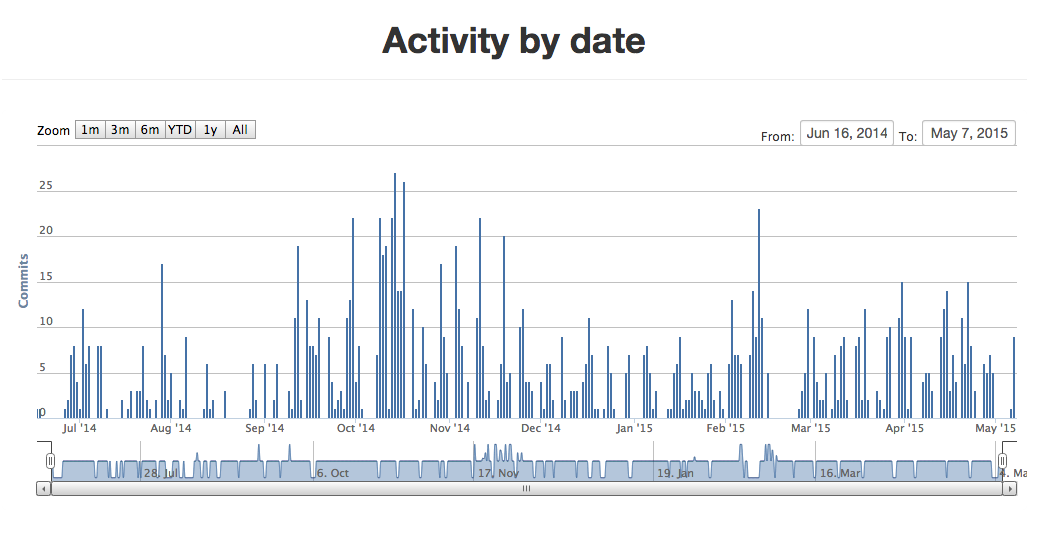
Stats: server-side
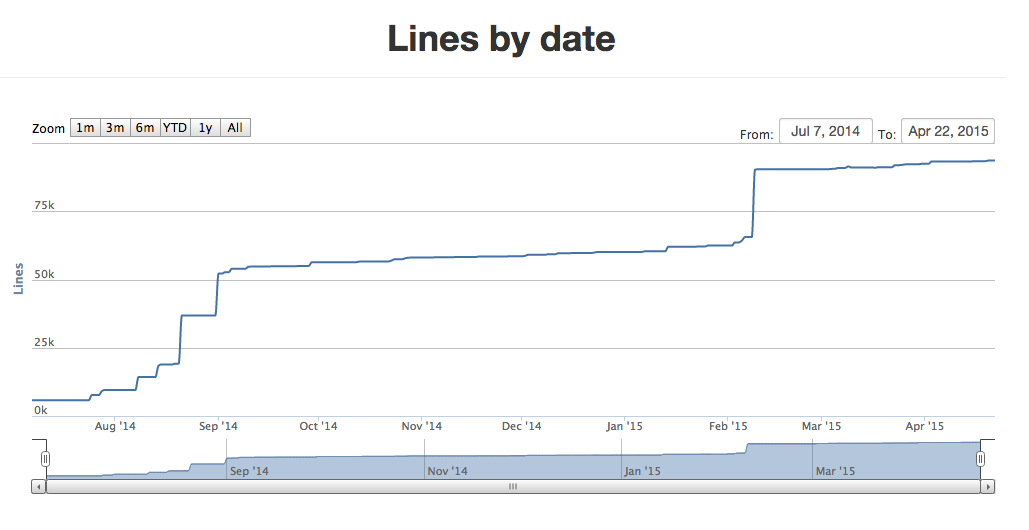
Stats: server-side
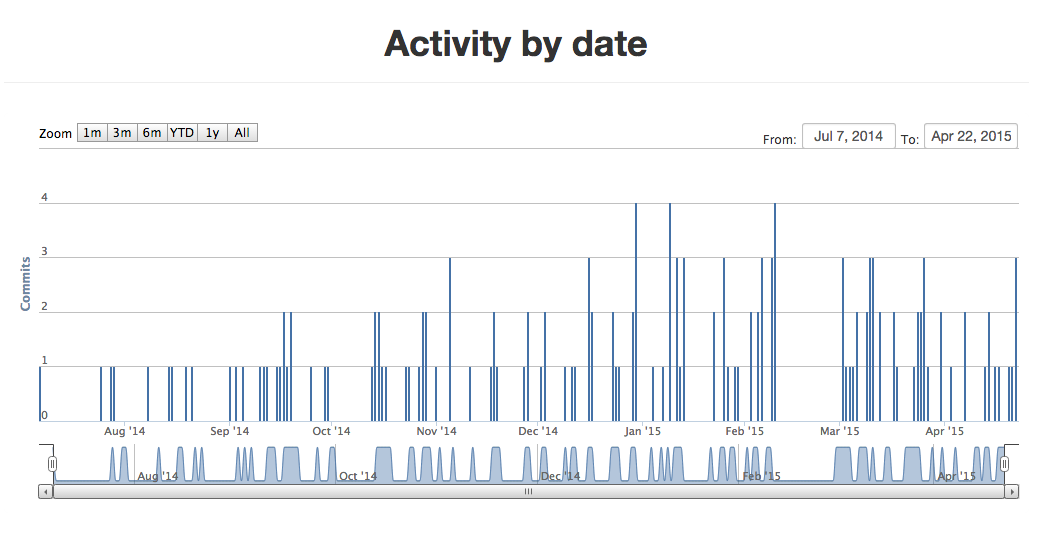
Agenda
- Efeckta integration
- Cassandra storage
- Rethink the UI workflow
- API docs
- Reactive rendering
- Local development
- Umbraco from Git
- Pitfalls on web recording
Efecta integration
incorporate the self study layer in Camp, to make student experience exactly the same as in study plan, but...we're not the school team
camp
topic
N/A
week
task
step
activity
school
course
level
unit
lesson
step
activity
"course structure" revamped
camp
topic
N/A
week
task
step
activity
school
course
level
unit
lesson
step
activity
/school/e12/#school/2262345/385/550/2074/8861/2312/116439
school URL schema
camp
topic
N/A
week
task
step
activity
school
course
level
unit
lesson
step
activity
/camp/study#/study/YGyu5kxSRvyOgmxwaU9a2w/%3DRjO65LOSDulAgHXO1Kmig/c3%2BCxfd1TOaV4gCXdABIeA/IvltDfODS1usiBedyKPYRA
camp URL schema
/camp/study#/study/YGyu5kxSRvyOgmxwaU9a2w/%3DRjO65LOSDulAgHXO1Kmig/c3%2BCxfd1TOaV4gCXdABIeA/IvltDfODS1usiBedyKPYRA
camp url segment - base64 encoded UUID
/school/e12/#school/2262345/385/550/2074/8861/2312/116439
school url segment - uid
completely Routable UI
hash
#/study/YGyu.../
#/study/YGyu.../%3D.../
#/study/YGyu.../%3D.../n9W.../
#/study/...*.../eOrulp.../
UI state
which camp
which camp week
scroll into a camp task
open activity container of one task step
CAMP study page
resolve the UI puzzle
Efecta 13 is definitely a legacy application written in 4 years ago on troopjs 1.0 and is a bounch of jQuery plugin soup
challenges
Thanks to troop Efecta 13 is a requireJS application completely driven by hub events
clue
In case you don't know hub events
A significant advantage of using hub is components can inject themselves in processing flow without modifying the host application, this allows for swapping out implementations of components without having to update all the dependent applications.
{lesson: '8861', step:'47198',activity:...}
{step:{...}, lesson: {}}
{id: "lesson!8861" …}
{id: "step!47198" …}
{id: "activity!142748" …}
Efecta I/O in troop events
load
load/result
(un)load/lesson
(un)load/step
(un)load/activity
step.1 - create a legacy sandbox
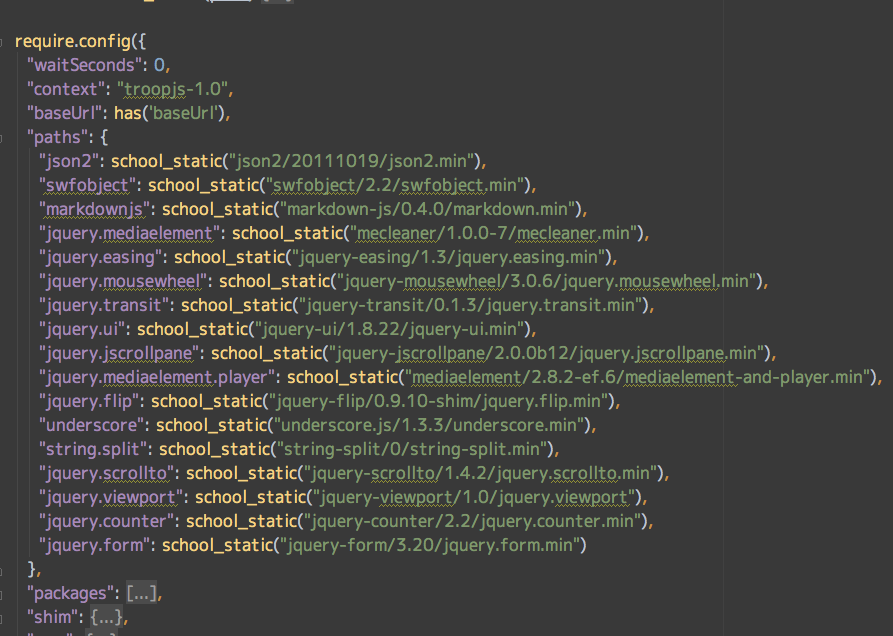
step.2 - bridge to sandbox events
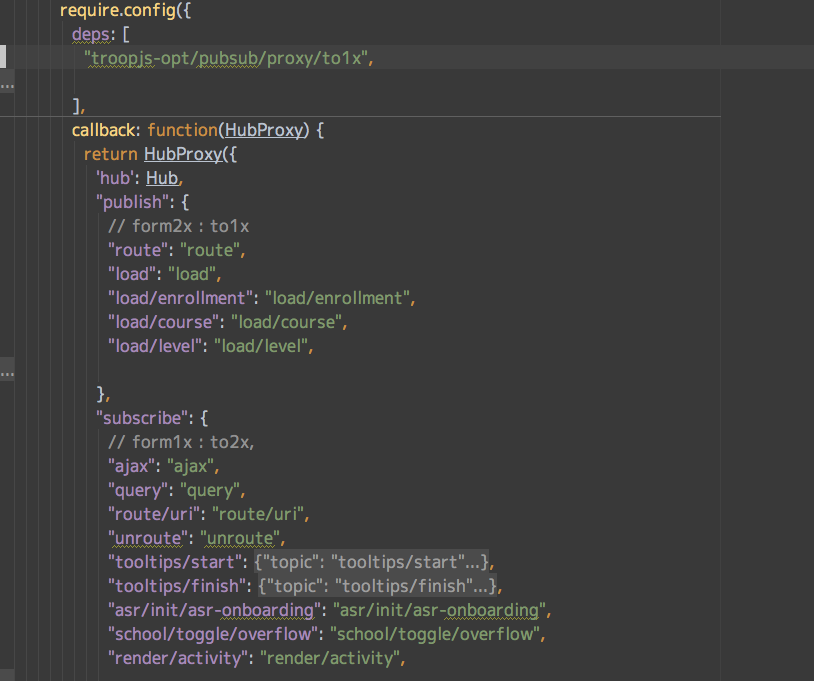
step.3 - open a camp "step" in Efecta
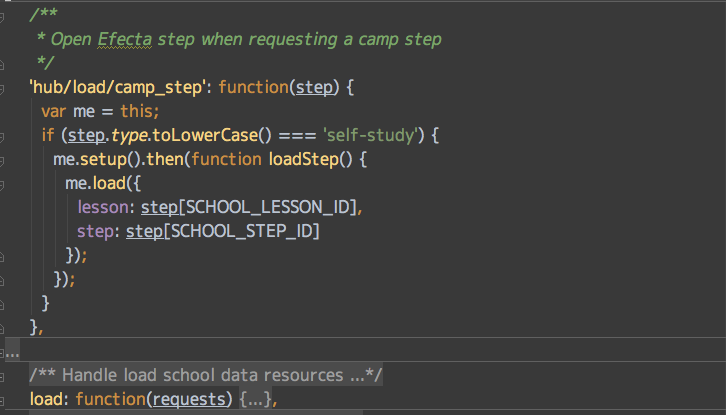
step.4 - fulfill data requests from Efecta
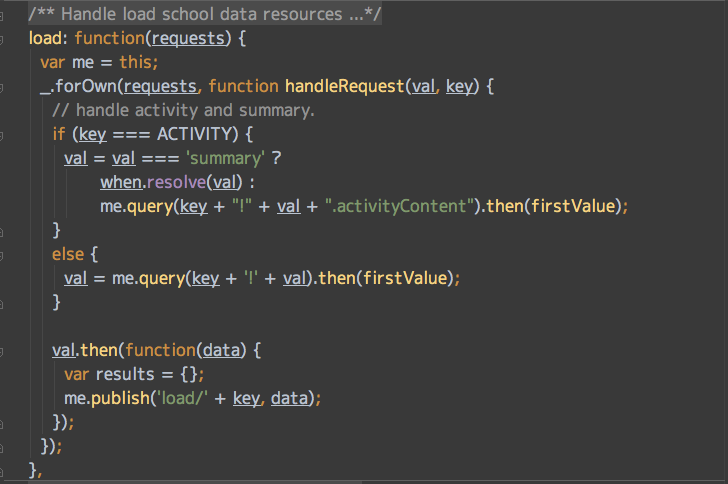
step.last - sandbox the CSS
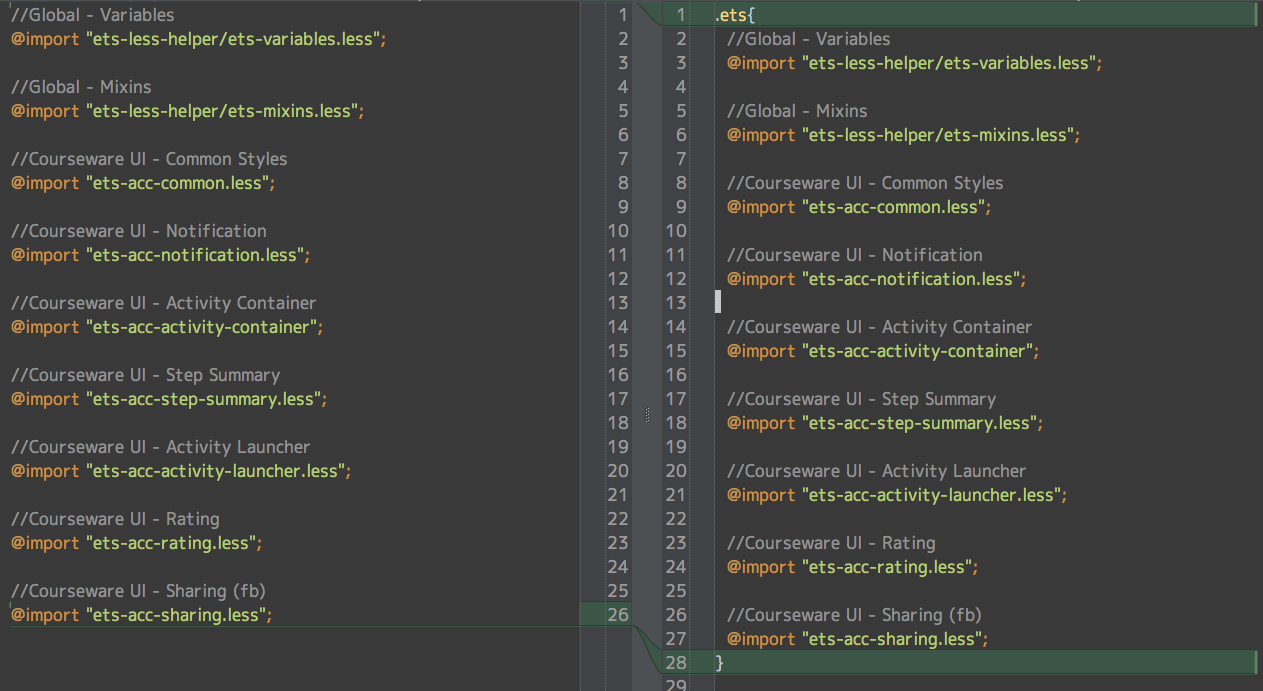
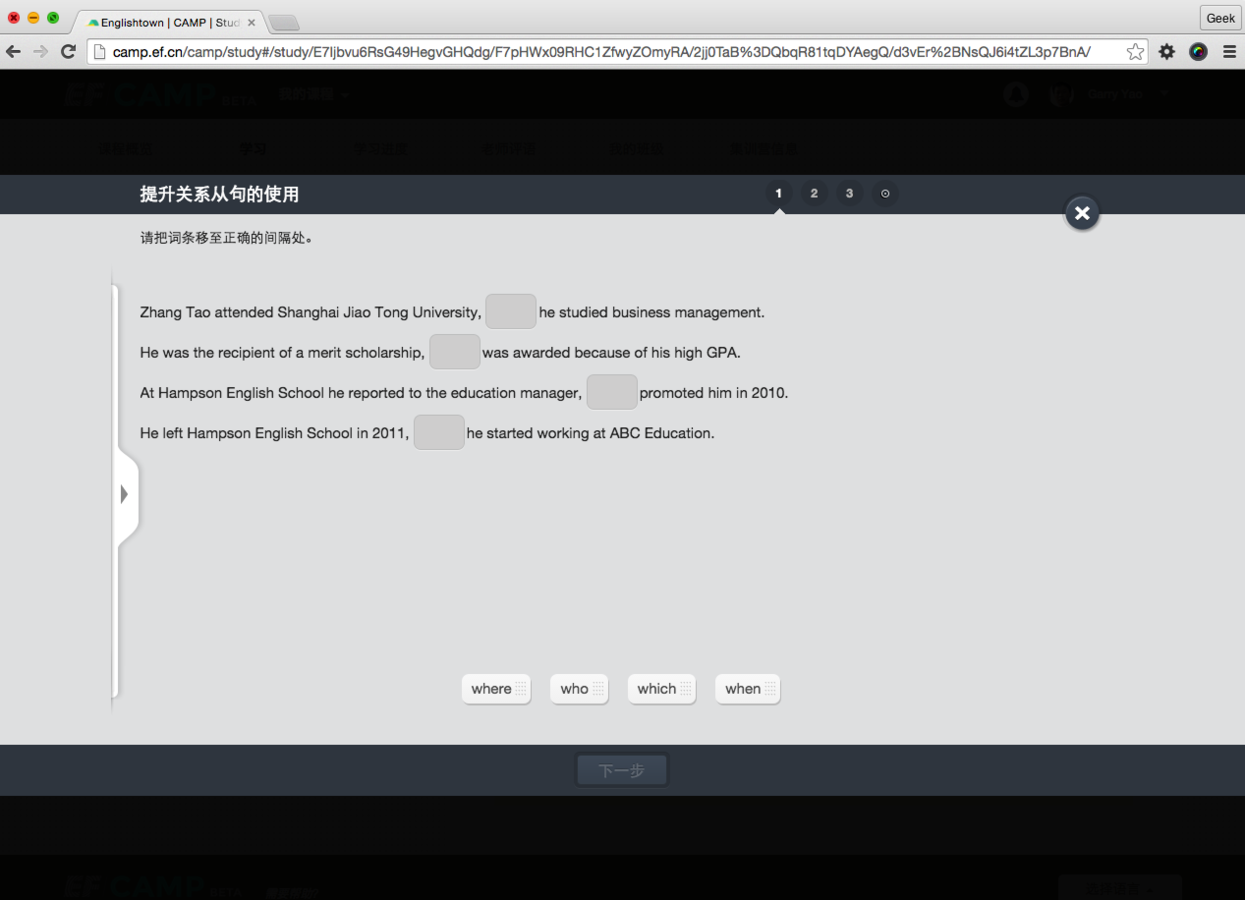
Cassandra storage
Cassandra is perfect for managing large amounts of data across multiple data centers and the cloud. Cassandra delivers continuous availability, linear scalability, and operational simplicity across many commodity servers with no single point of failure, along with a powerful data model designed for maximum flexibility and fast response times.
Why use Cassandra
- Cross Data Center Camp Configuration
- Cross Data Center Students
- Cross Data Center Social Activity
- Cross Data Center Teacher feedback
- Cross Data Center Progress report
- Approve and Support from T-team
Weakness of Cassandra & CQL
- No Joins
- No arbitrary Where statement
- No arbitrary Order By statement
- No Group By
- A few operators are supported
- Secondary Index
Data Model
- Forget about RDBMS
- Query First
- No Secondary Index
- Customized Secondary Index
Try Cassandra
CREATE TABLE Class_Tasks(
Class_Id uuid,
Class_Section_Id uuid,
Class_Task_Id uuid,
Task_Id uuid,
Task_Order int,
Task_Type text,
Task_Sub_Type text,
Name text,
Description text,
Start_Time text,
End_Time text,
Insert_Date timestamp,
Update_Date timestamp,
PRIMARY KEY(
Class_Id,
Class_Section_Id,
Class_Task_Id
)
);
CREATE TABLE Class_By_Task(
Class_Task_Id uuid,
Class_Section_Id uuid,
Class_Id uuid,
Insert_Date timestamp,
Update_Date timestamp,
PRIMARY KEY (
Class_Task_Id
)
);Introduce Solr
The unique combination of Cassandra and DSE Search with Solr features robust full-text search, hit highlighting, and rich document (PDF, Microsoft Word, etc) handling.
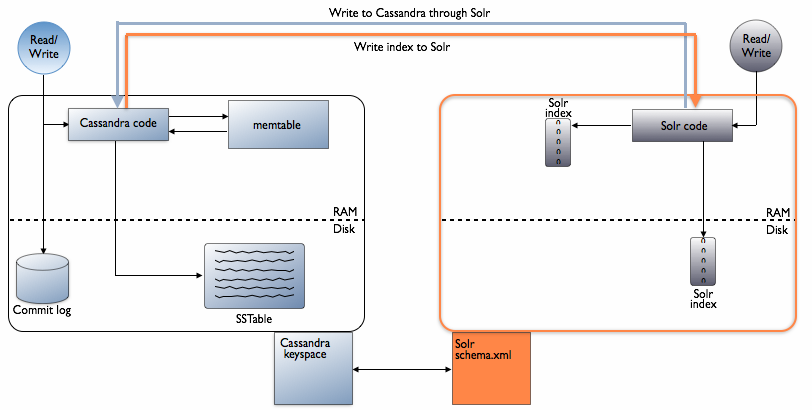
Data Model with Solr
create table group_lesson_feedback(
class_id uuid,
class_task_id uuid,
comment text,
student_status text,
teacher_member_id int,
closed boolean,
notified boolean,
prop_ map<text, text>,
insert_date timestamp,
update_date timestamp,
PRIMARY KEY(
class_id,
class_task_id
)
);e.g. the column value of student_status:
[
{
"memberid": 1234,
"absent": "true",
"techissue": "false"
},
{
"memberid": 56789,
"absent": "false",
"techissue": "false"
}
]e.g. the column value of prop_ map:
{
'prop_name1': 'value1',
'prop_name2': 'value2'
}Use Solr with CQL
- Generate Solr Config and Schema resources
<?xml version="1.0" encoding="UTF-8" standalone="no"?>
<schema name="autoSolrSchema" version="1.5">
<types>
<fieldType class="org.apache.solr.schema.TextField" name="TextField">
<analyzer>
<tokenizer class="solr.StandardTokenizerFactory"/>
<filter class="solr.LowerCaseFilterFactory"/>
</analyzer>
</fieldType>
<fieldType class="org.apache.solr.schema.TrieIntField" name="TrieIntField"/>
<fieldType class="org.apache.solr.schema.UUIDField" name="UUIDField"/>
<fieldType class="org.apache.solr.schema.BoolField" name="BoolField"/>
<fieldType class="org.apache.solr.schema.TrieDateField" name="TrieDateField"/>
</types>
<fields>
<dynamicField indexed="true" multiValued="false" name="prop_*" stored="true" type="TextField"/>
<field indexed="true" multiValued="false" name="class_id" stored="true" type="UUIDField"/>
<field indexed="true" multiValued="false" name="class_task_id" stored="true" type="UUIDField"/>
<field indexed="true" multiValued="false" name="closed" stored="true" type="BoolField"/>
<field indexed="true" multiValued="false" name="notified" stored="true" type="BoolField"/>
<field indexed="true" multiValued="false" name="teacher_member_id" stored="true" type="TrieIntField"/>
</fields>
<uniqueKey>class_id</uniqueKey>
</schema>Use Solr with CQL
--e.g. query by any column configured in solr schema
select comment, student_status, closed, prop_
from group_lesson_feedback
where solr_query = 'teacher_member_id:12345678';--e.g. query by dynamic column "prop_"
select comment, student_status, closed, prop_
from group_lesson_feedback
where solr_query = 'prop_name2:value2';Key_Space configuration
- Replication factor
- Read Consistency Level (local_Quorm)
- Write Consistency Level (local_One)
--e.g. Camp key_space on live
CREATE KEYSPACE IF NOT EXISTS Camp
WITH REPLICATION = {
'class': 'org.apache.cassandra.locator.NetworkTopologyStrategy',
'US1': 3,
'CN1': 3
};Tips
- Use prepared statement
- Escape single quote for concatenate statement
- Don't use "select * from" statement
- Avoid Alter column type on existing table
- Ask for help from Teddy, Simon and Adrain
References
API docs
There must be a formalized way of describing application APIs, before and after they are implemented, this reduce significantly the communication cost between front-back-end and reinforces API robustness and stablization.
we start from, documenting the model
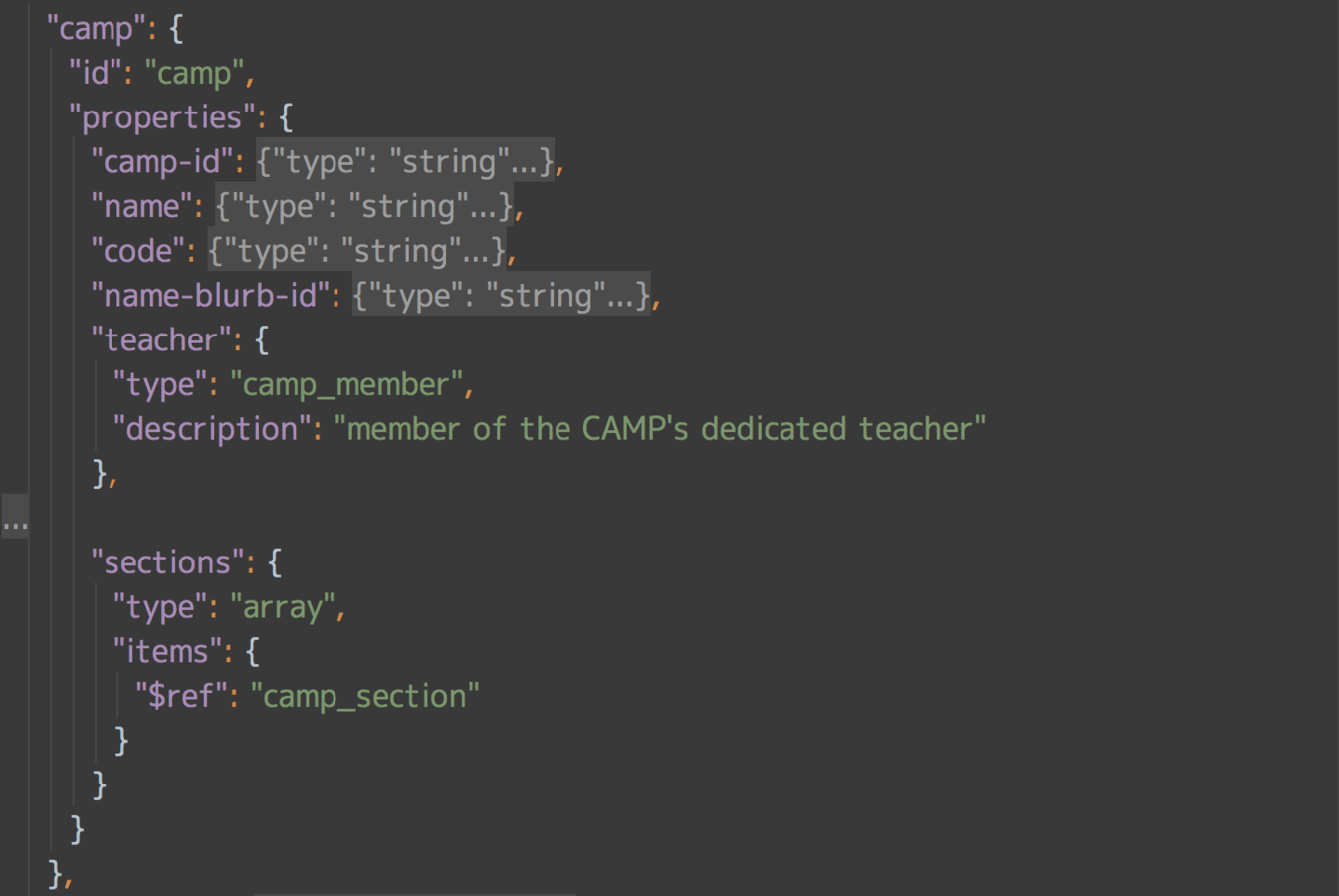
sooner we realize for what we're doing, there's an existing standard...
Swagger!
the Swagger Schema allows the definition of data type expectations, this schema is based on the JSON Schema Specification Draft 4, and uses a predefined subset of it.
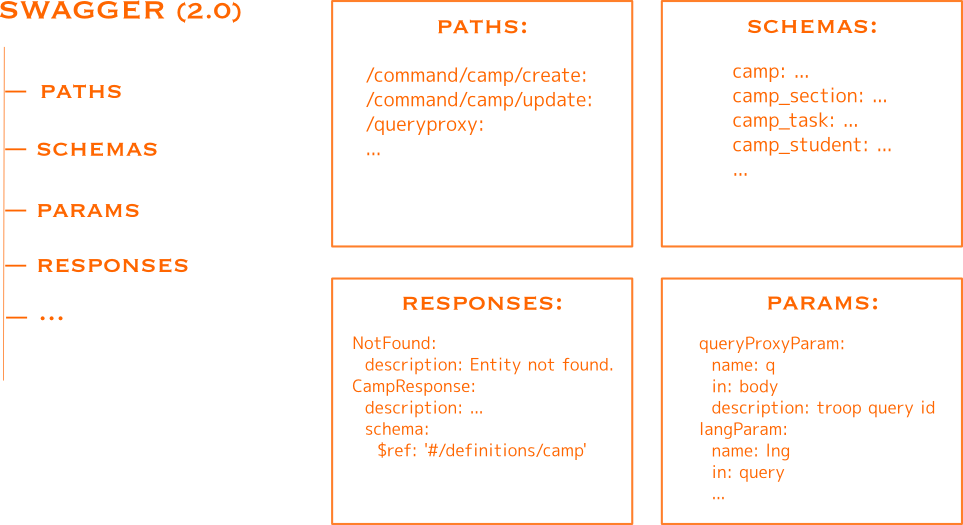
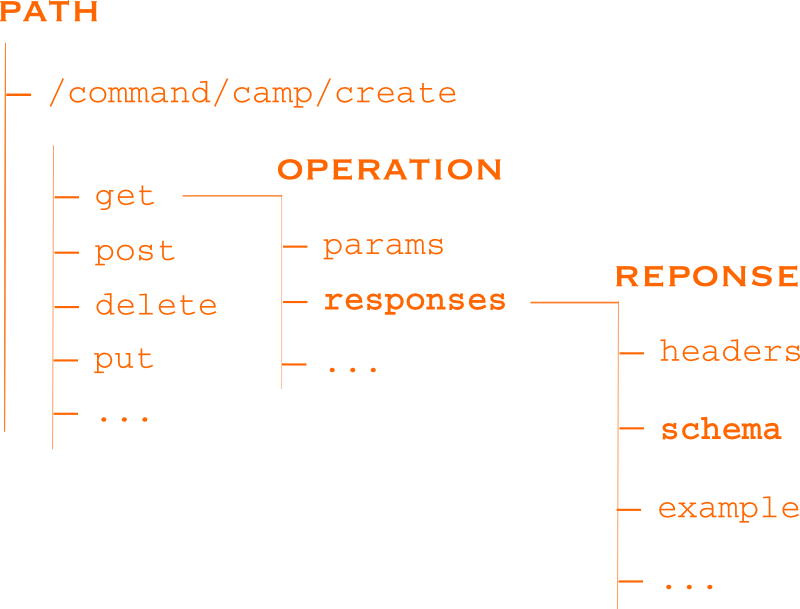
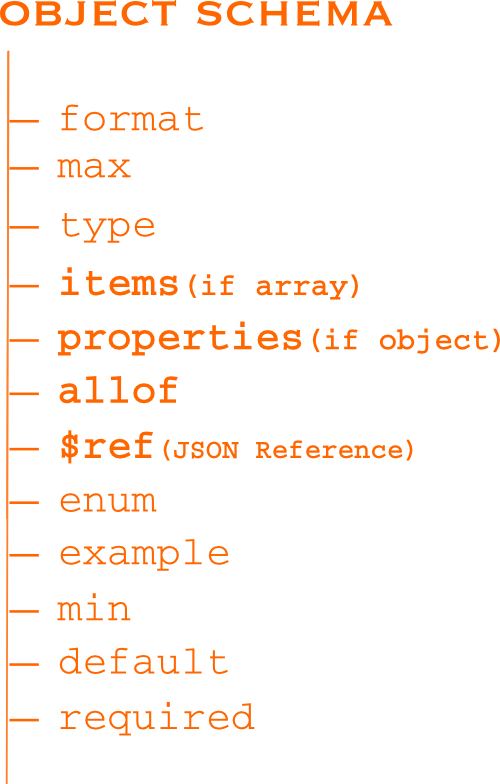
document a command
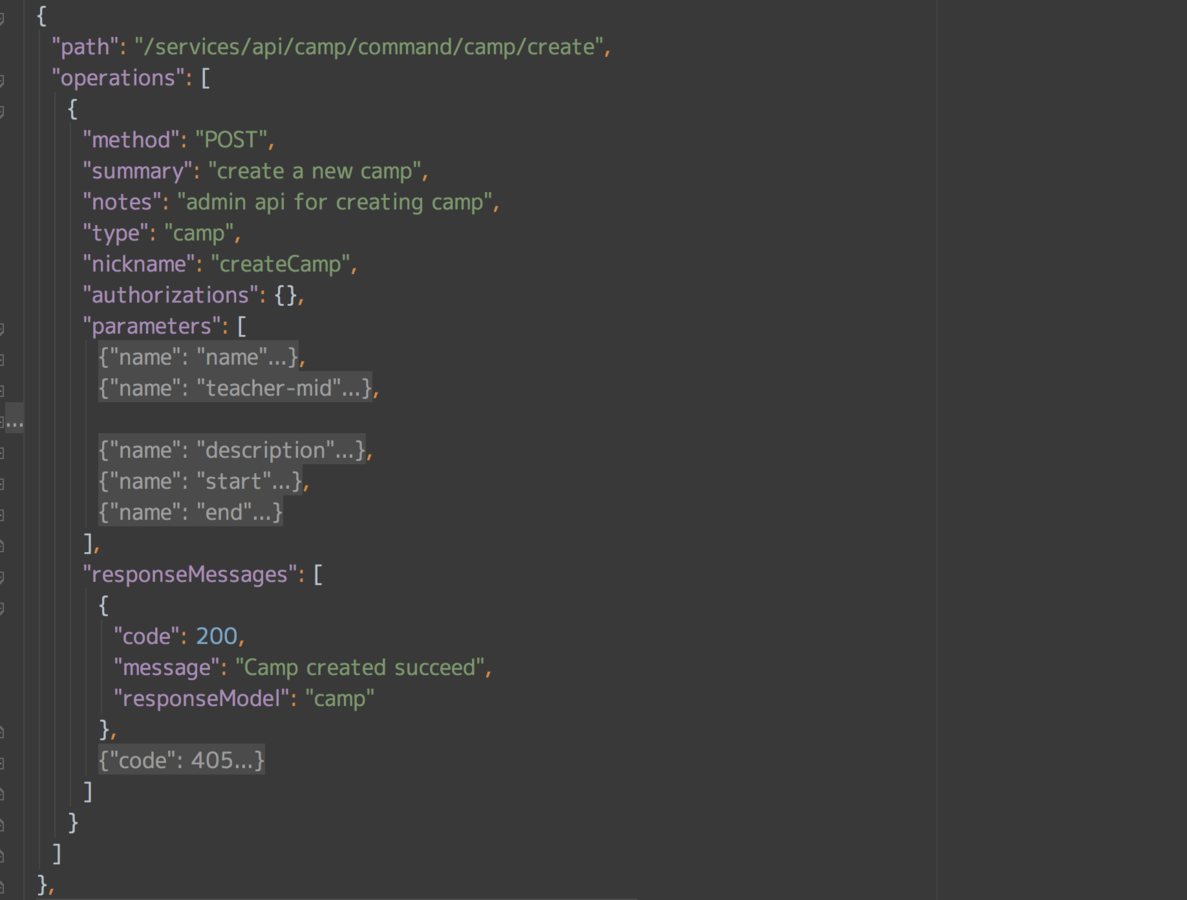
document a query
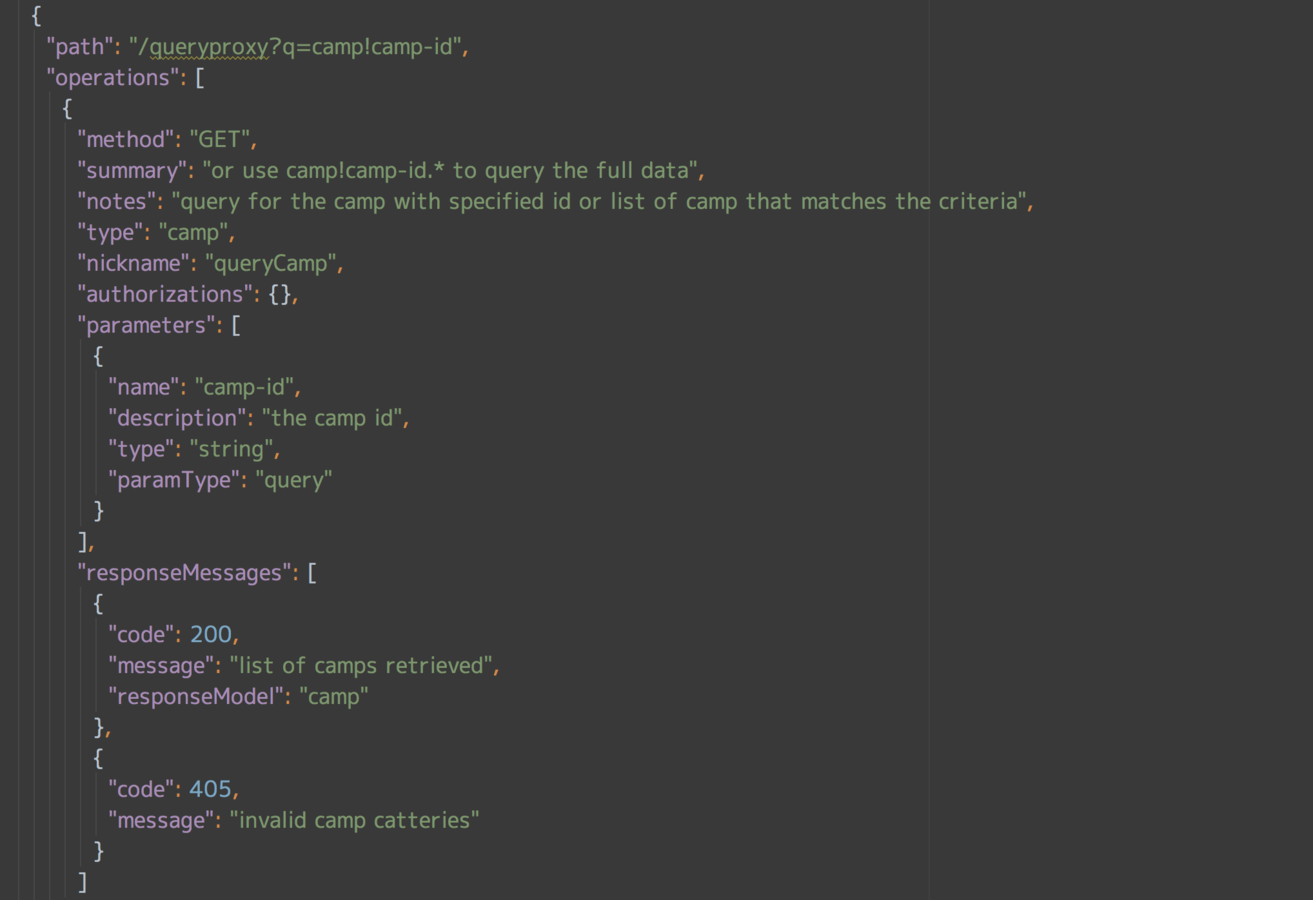
Applyied a few UI magics
You can even
try out each API live
kudos to @Teddy
Rethink the UI workflow
Rethink of the best practices to deliverUIs influenced by the movie producing industry.
#1
I'm waiting for the whole page to reload, just to test that little change.
#2
The server API required for testing this feature is not yet ready.
#3
My team have no idea of what the final UI looks until 3 weeks later.
If you have the same pain...
Evil
no separation of concerns
The “layers" of UX

Redefine "delivery"
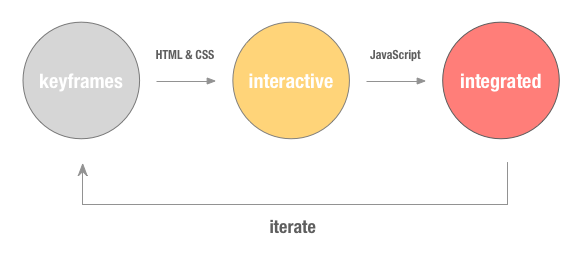
KEYFRAMES
focus
- informational structure
- layout, styles
- markup
- typography, color, graphic...
design specs in "web format"
KEYFRAMES
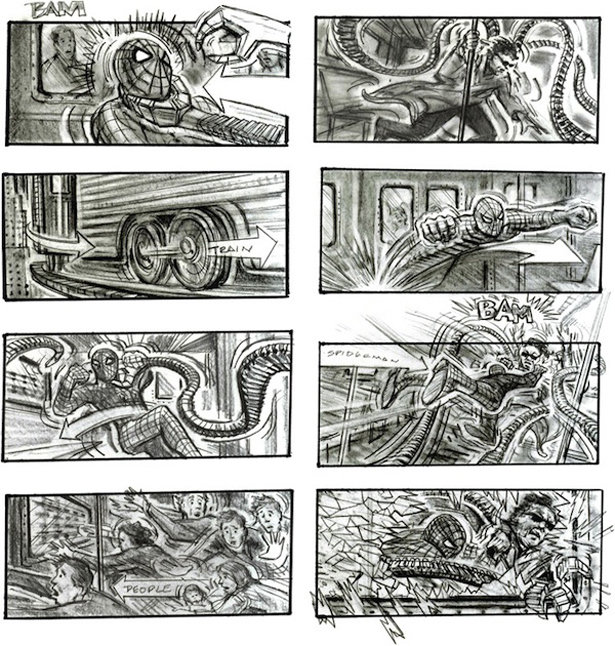
ITERACTIVES
focus
- user stories and interaction details
- interaction flow boundaries
- transition/animation
user interaction flow and state transitions
INTEGRATIONS
focus
server and environmental integrations
- API data validity
- other sever environment
- authentication
- architecture
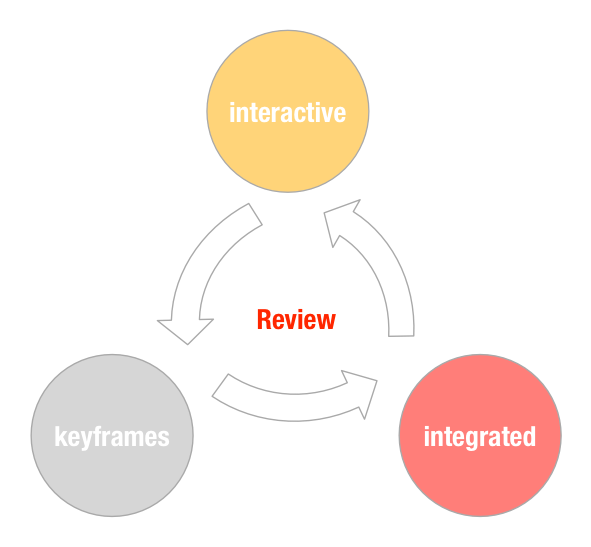
Agileness gains
Reactive rendering
Trying to understand how to apply individual DOM manipulation smartly enough
to avoid re-rendering for each scenario,
is an super insufficient as well as error prune procedure
all front-end book will tell you:
dom mutation is the most expensive part of the browser, performance wise application should avoid unnecessary DOM updates to but only to carry the least changes required.
This is what usually called "DOM sculpting", but it's really hard to make it right all the time!
here is where we usually start from...
a single state UI

DOM patch#1 created to incoperate data#1

new patch#2 presenting data#2,
is based on patch#1
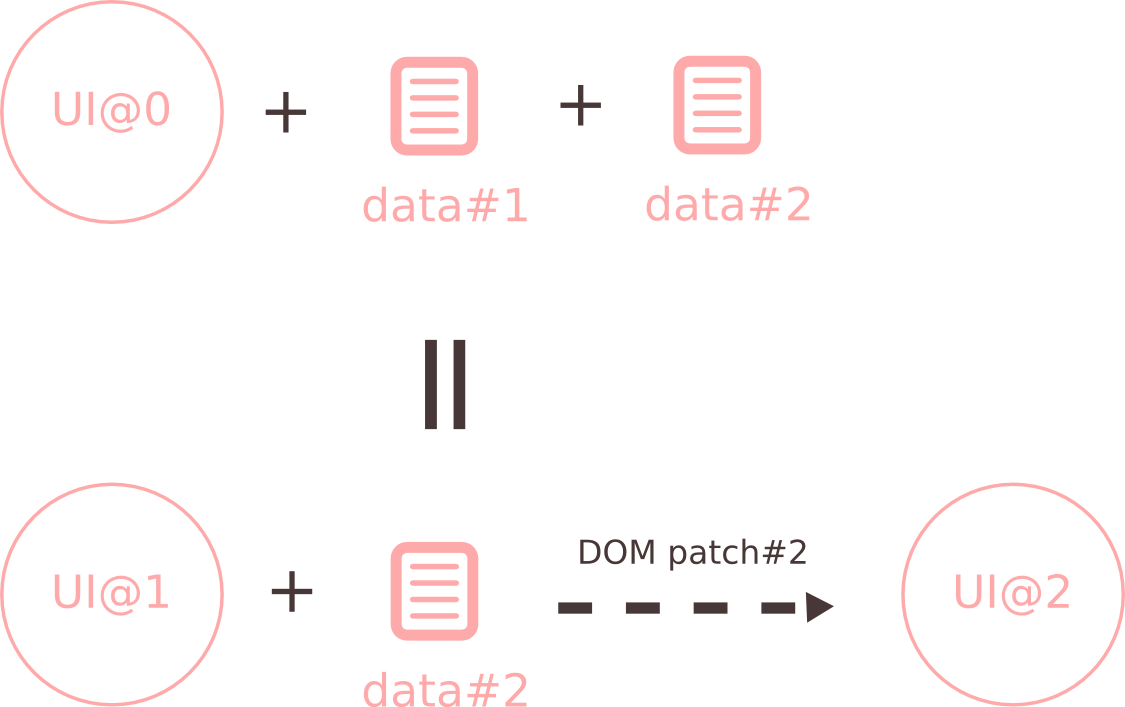
what if data#1 is removed,
or even comes after data#2
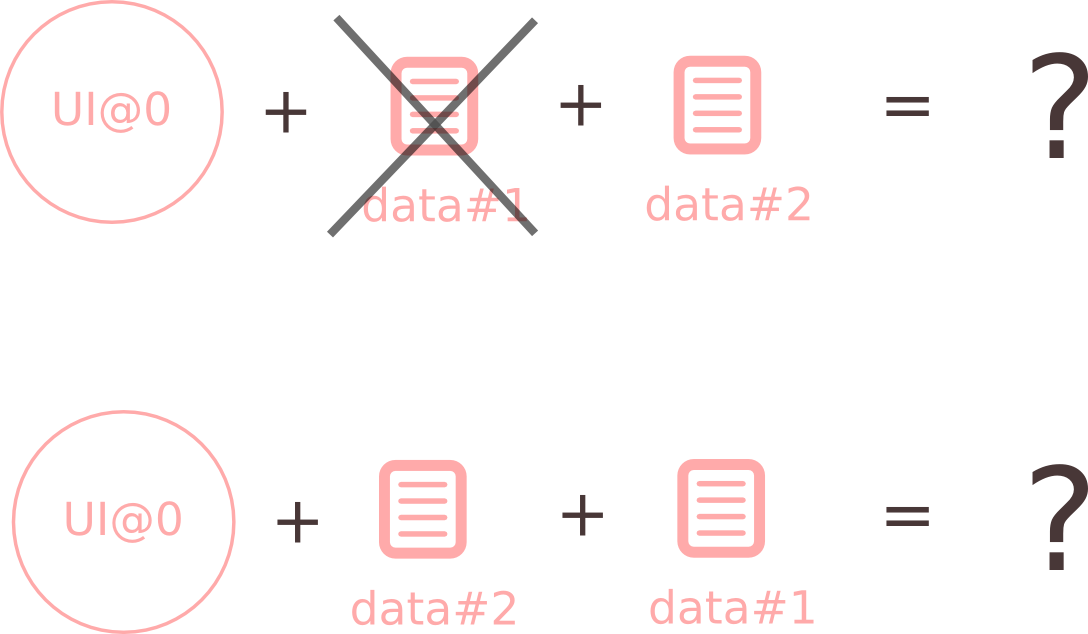
The Problem
- The application states are implicitly DOM dependent
- Every DOM mutations relies on the previous state thus cannot be ported
- No "single source of truth"
Consequences
- write spaghetti code that leads to error prune UI state
- view logic code has to be changed once a while and cannot sustain over time
Building UI in such a way is hard because there's no much state
- data is updated everywhere
- designs changes over time
- many ways of user input
In the 90s it was actually easier...
Just to refresh the page!
In the 90s it was actually easier...
That's originate the idea of
"reactive rendering"
React Rendering Algorithms
- let UI states sourced from a single object
- First-class "render" method that transform the state object into a new virtual DOM Tree
- ...diffs it with the previous rendered virtual DOM
- computes the minimal set of DOM mutations required and put them in queue
- ...batch apply the changes to only the affected nodes
components data flow
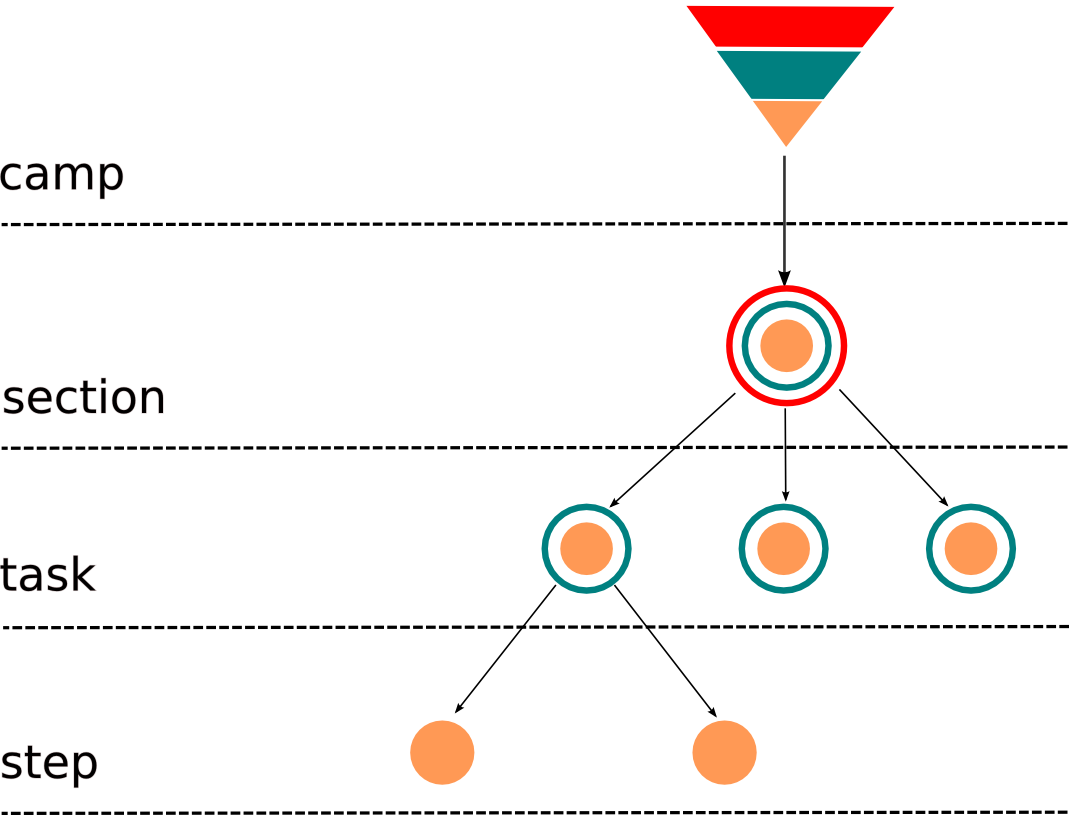
Troop widget composition
{{!--camp widget --}}
{{#each camp.sections}}
<div data-weave="widget/section(section)" data-section={{JSON.stringify(this)}}></div>
{{/each}}
{{!--section widget --}}
{{#each section.tasks}}
<div data-weave="widget/task(task)" data-task={{JSON.stringify(this)}}></div>
{{/each}}
{{!--task widget --}}
{{#each task.steps}}
<div data-weave="widget/step(step)" data-step={{JSON.stringify(this)}}></div>
{{/each}}
Troop widget data flow

recursively render the camp data
render each section
render each task
render each step
blocked data flow
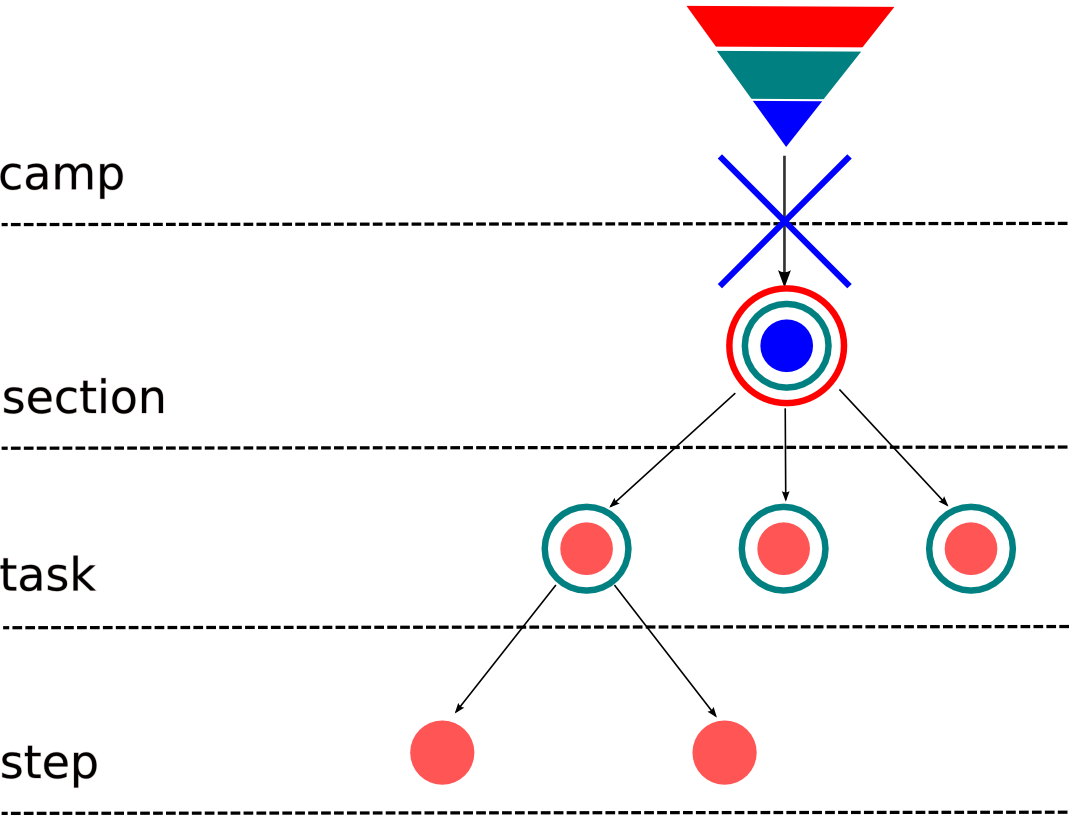
when "step" data changes on camp
?
?
?
React component composition
/* camp.jsx */
return camp.sections.map(function(section) {
return <Section section={section} />;
});
/* section.jsx */
return section.tasks.map(function(task) {
return <Task task={task} />;
});
/* task.jsx */
return task.steps.map(function(step) {
return <Step step={step} />;
});
React component data flow
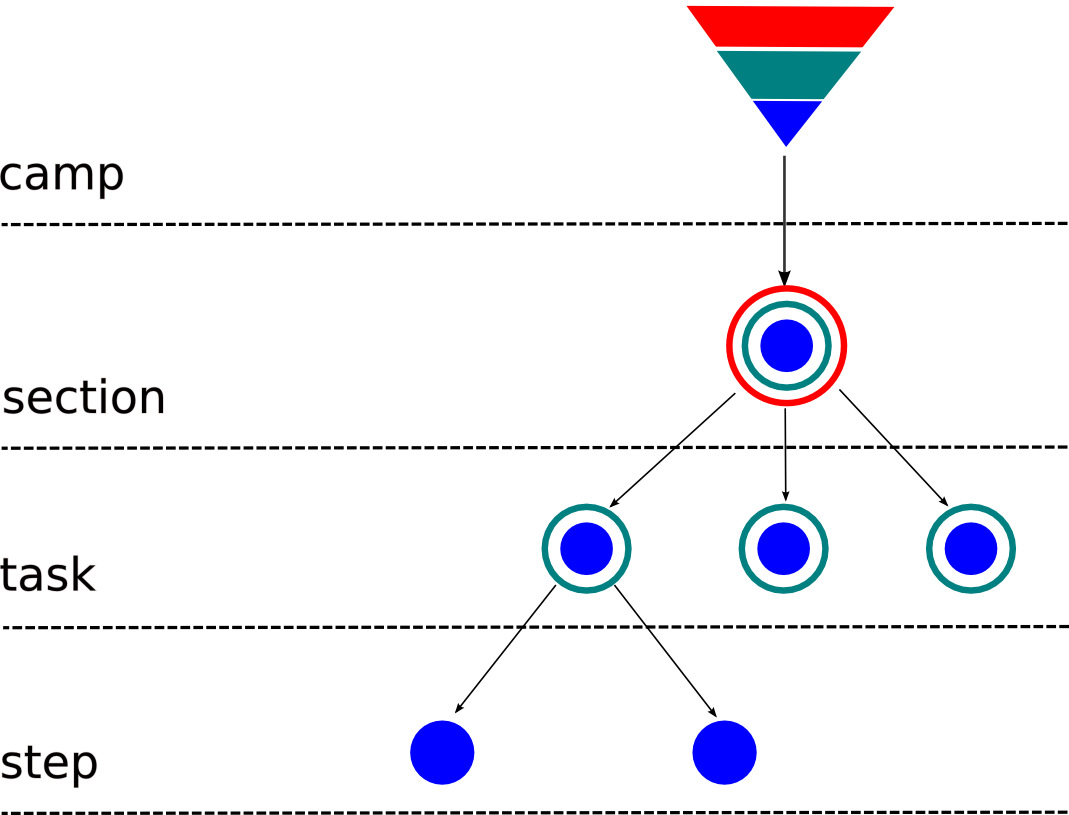
when "step" data changes on camp
update each section
update each task
step is updated!
Re-render the whole app on each update, let the framework to remember which widget is to create or to update
The React Principle
Develop Locally
For the most productive frontiers, local development shall requires no server environment setup at all, yet remains as close as possible to all production environments, aka. load from HTML
Goals
- Bootstrap page from a HTML file, not a ASPX file
- RequireJS load modules, individually, locally
- Import CSS files individually, locally
- Load CMS contents locally
- Non-local resources including API endpoints, medias and blurbs
Non-local resources
1. local DNS map
- campuat.englishtown.com
- qa.englishtown.com
- www.englishtown.com
- campuat.local
- qa.local
- www.local
#/usr/local/etc/dnsmasq.conf
local=/localhost/
address=/dev/127.0.0.1example with dnsmasq
Non-local resources
2. virtual host + reverse proxy
- static files (.js/.css) -> resolve as local file
- .html files -> proxied to local server
- API endpoints -> proxied to "the" server
- handlers -> proxied to "the" server
Non-local resources
2. virtual host + reverse proxy
# CAMP QA Reverse Proxy
<VirtualHost *:80>
DocumentRoot /Users/garry/Stash/camp-ui
ServerName qa.dev
ProxyPassMatch ^/(.*\.html)$ http://localhost:3000/$1
ProxyPass /camp/login http://qa.englishtown.com/camp/login
ProxyPass /camp/enroll http://qa.englishtown.com/camp/enroll
ProxyPass /camp !
ProxyPass / http://qa.englishtown.com/
ProxyPassReverse / http://qa.englishtown.com/
ProxyPassReverseCookieDomain qa.englishtown.com qa.dev
</VirtualHost>
([^.]*).dev -> $1.englishtown.com
HTML file as handler
- Use server variables to assemble the page content, e.g. getTrans::12345, getContent::cms_key
- Embed build instructions into the HTML file, e.g. concatenation
HTML file as handler
<!doctype html>
<html lang="en">
<head>
<title>Englishtown | CAMP | Study </title>
<!-- build:css css/camp.css -->
<link rel="stylesheet" href="icons/style.css"/>
<link rel="stylesheet" href="css/camp.css"/>
<!-- endbuild -->
getContent::Camp_common-head
<!-- build:js camp.js -->
<script src="bower_components/requirejs/require.js"></script>
<script src="common-camp.js"></script>
<!-- endbuild -->
getContent::Camp_common-tail
</head>
<body class="ets-spinning-global" data-weave="camp-ui/widget/layouts/main">
<div class="spinner"></div>
</body>
</html>
HTML file as handler
Question: how to load such HTML file with server variables resolved?
HTML file as handler
Introduce local handlers
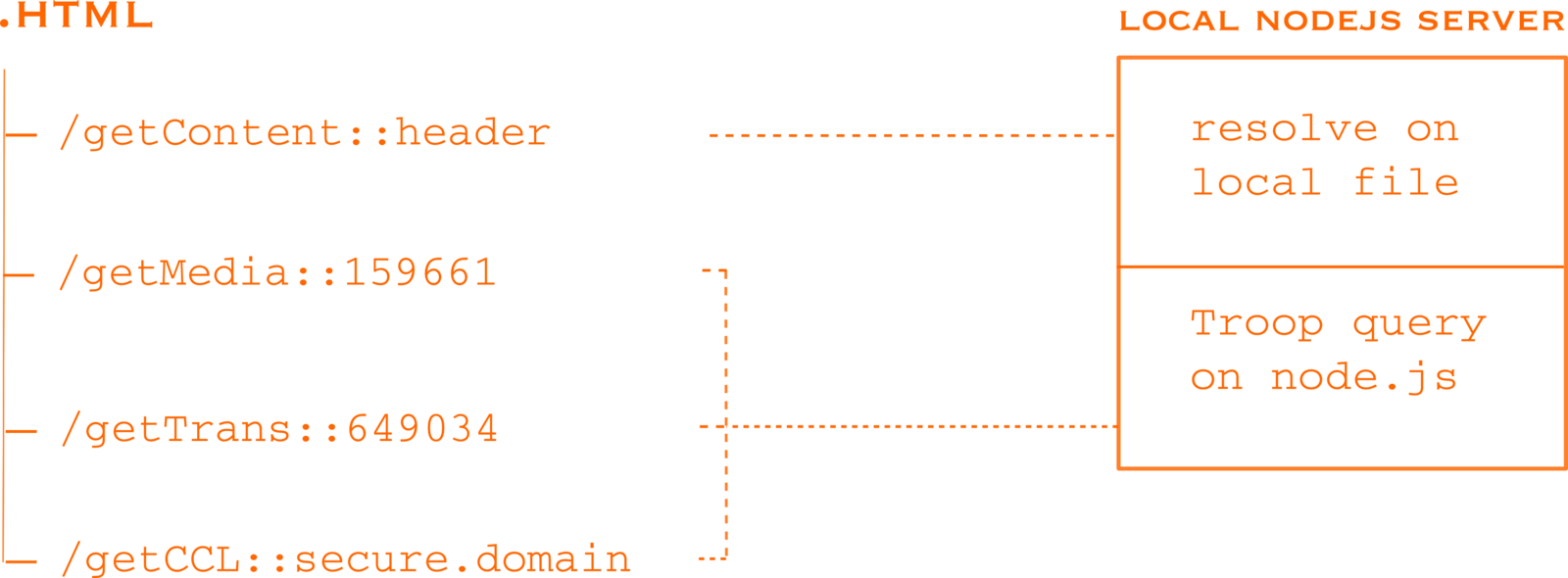
HTML file as handler
Introduce local handlers
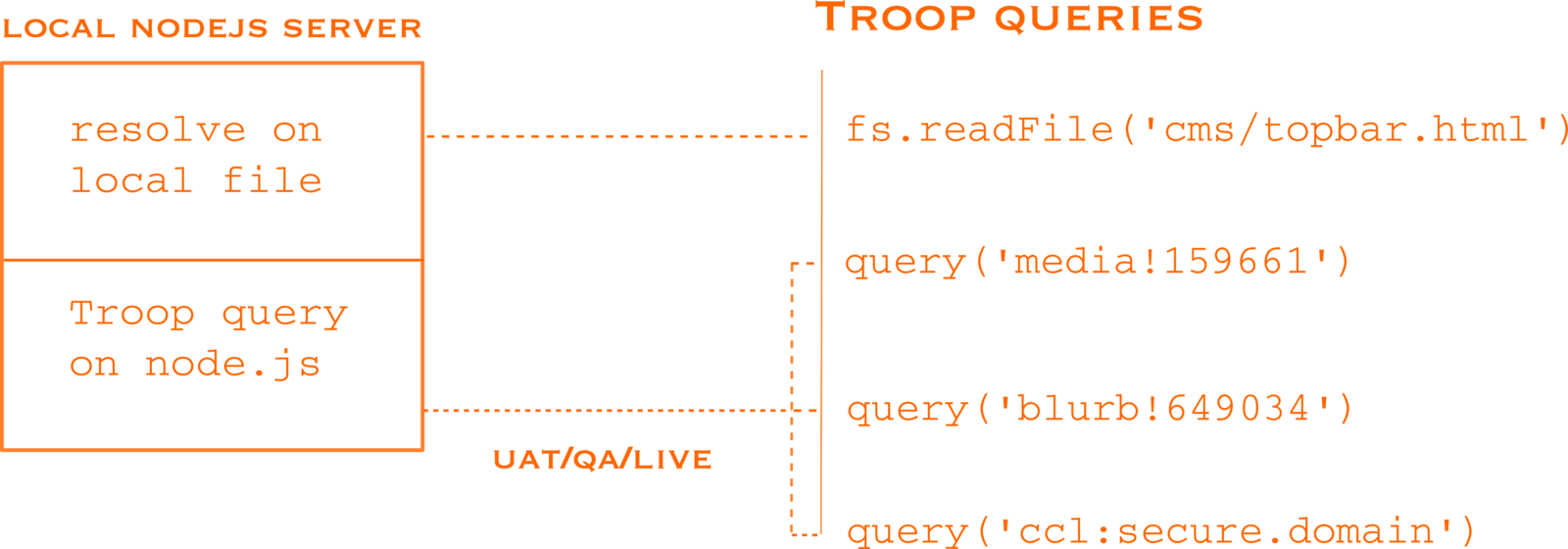
Load JS modules
DEV
- baseUrl:'bower_components'
- all modules are loaded individually
Load JS modules
>UAT
- baseUrl:{CCL:configuration.servers.cache}/_shared/camp-ui/{CCL:camp.ui.version}/bower_components (aka. CDN)
- mandatory modules are loaded as one single bundled module
- lazy modules are loaded individually on demand
Transcompiler & watch
- create a "src" directory as source level code
- watch over .js/.hbs/.less and compile with JSX/Handlebar/LESS
- copy those newer compiled to the "root" directory
- requirejs load modules assuming the same package structure
Umbraco from Git
CMS is a good point, but I always miss the developing experience from local files and the safety have everything version controlled in Git
Why Umbraco
breaks the dev flow
- Only one single version of the content, when you publish, you push to QA
- Permission control differs from Stash
- Cannot develop locally
- Terrible editing experiences (miss BATCH replace)
But that doesn't mean...
We have escaped from Umbraco
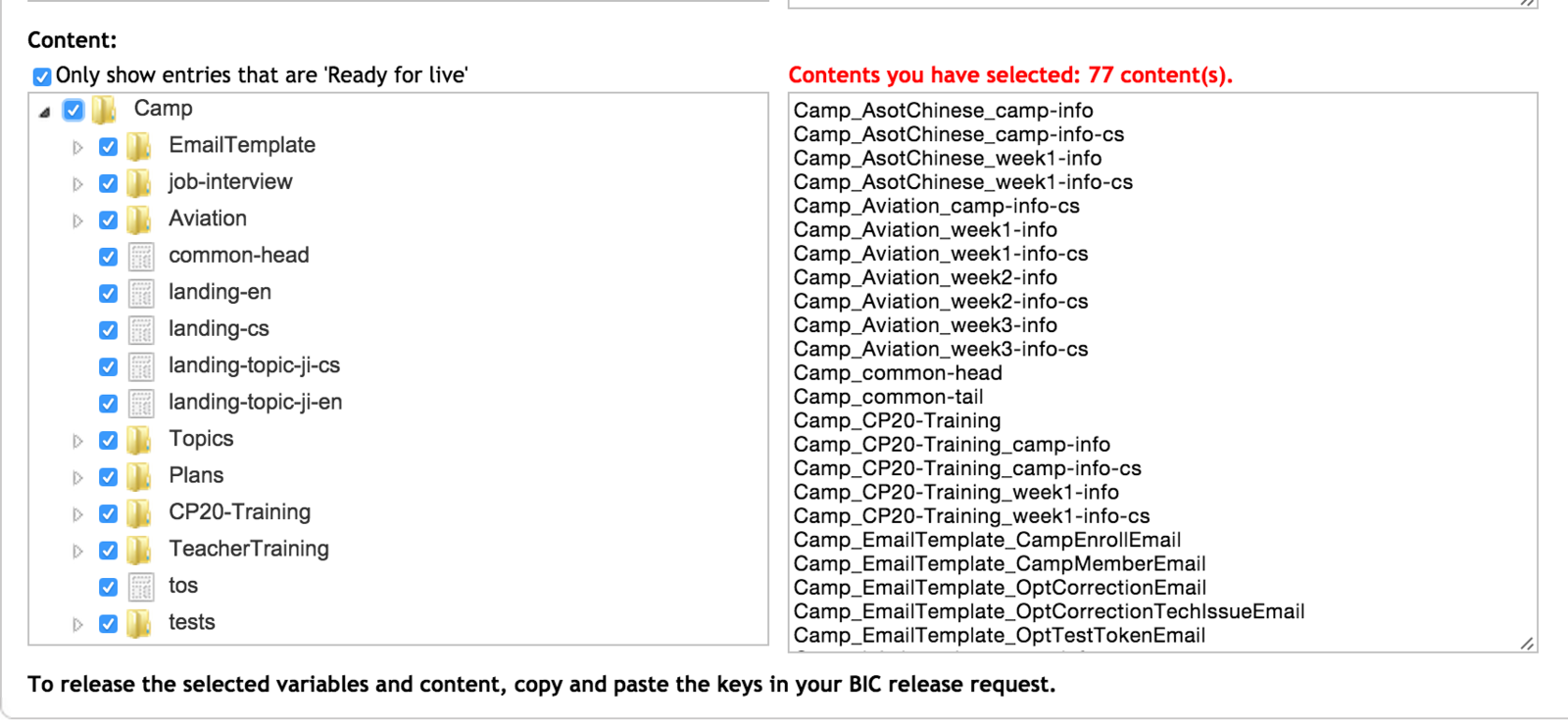
actually we used that exclusively:
Umbraco + Git?
Combine the best from both worlds
- track CMS nodes as local files
- put them as GIT files for version control
- pull from Umbraco when new node has been added
- making GIT commits for changes
- publish to Umbraco with a GIT push hook
How do you to Umbraco?
A Umbraco CLI
npm install -g umbra
18:50 $ umbra -h
Usage: umbra [options] [command]
Commands:
push [files...] publish specific file(s) or the entire "cms" directory to Umbraco
pull fetch newly created Umbraco contents back to the "cms" directory
CLI for publish Umbraco CMS contents from local files
Options:
-h, --help output usage information
-V, --version output the version number
09:24 $ ll cms/*landing*.html
-rw-r--r--+ 1 garry staff 9119 May 7 17:31 cms/Camp_landing-cs.html
-rw-r--r--+ 1 garry staff 9781 May 7 17:31 cms/Camp_landing-en.html
-rw-r--r--+ 1 garry staff 773 May 7 17:31 cms/Camp_landing-navbar-cs.html
-rw-r--r--+ 1 garry staff 767 May 7 17:31 cms/Camp_landing-navbar-en.html
-rw-r--r--+ 1 garry staff 792 Apr 26 17:21 cms/Camp_landing-navbar-topic-ji-cs.html
-rw-r--r--+ 1 garry staff 794 Apr 26 17:21 cms/Camp_landing-navbar-topic-ji-en.html
-rw-r--r--+ 1 garry staff 15103 May 7 17:31 cms/Camp_landing-topic-ji-cs.html
-rw-r--r--+ 1 garry staff 16307 May 7 17:31 cms/Camp_landing-topic-ji-en.html
09:24 $ umbra push cms/*landing*.html
[ok] camp_landing-en (31744) has been published as "getContent::Camp_landing-navbar-en
<d..."
[ok] camp_landing-navbar-topic-ji-en (33202) has been published as "<nav class="navbar navbar-default nav..."
[ok] camp_landing-topic-ji-cs (31750) has been published as "getContent::Camp_landing-navbar-topic..."
[ok] camp_landing-navbar-cs (33199) has been published as "<nav class="navbar navbar-default nav..."
[ok] camp_landing-cs (31748) has been published as "getContent::Camp_landing-navbar-cs
<d..."
[ok] camp_landing-navbar-topic-ji-cs (33201) has been published as "<nav class="navbar navbar-default nav..."
[ok] camp_landing-navbar-en (33197) has been published as "<nav class="navbar navbar-default nav..."
[ok] camp_landing-topic-ji-en (31751) has been published as "getContent::Camp_landing-navbar-topic..."
Hook into Git
Client hooks
- pre-rebase
- post-rewrite
- post-merge
- pre-push
Server hooks
pre-recieve
post-recieve
update
Hook into Git
pre-push (local)
- requires developer setup
- impossible with changes via pull-request
- less fault proof
update (server)
no developer setup
requires server-side (Stash) support
less error prune, more accurate
Hook into Git
git hook? | git diff-tree $ref head | grep "cms" | umbraco push
Umbraco publishing in a pipe
Github hook is better
github web hook | http listener | git fetch |
git diff-tree $ref team/virus/develop |
grep "cms" | umbraco push
The reworked CMS releasing
- create CMS nodes in Umbraco & umbra pull
- Develop locally in feature/branch
- Review changes locally
- commit and pull request to team/branch
- git hooks & umbra pushed
- Your CMS changes is now published on QA!
- Go through the rest of the BIC
Web Recording
Base on Flash
-
Tech check (Microphone, Chrome)
-
MP3 Encoder (Open source)
- Audio File Upload (Cassandra provide by Adrian Gonzalez)
- Trouble Shoot
Upload File to Cassandra
- API
http://{hostname}:{port}/opt-media/upload
- Authentication by CMus and et_sid
- Test Page
http://qa.englishtown.com/opt-media/form
- Doc:
https://stash.englishtown.com/...
Pitfalls
- A lot of user record noise like
Client Environment
- OS
- Flash version
- Browser - Chrome 31.0.1650.63
Client Environment
-
OS - XP
- Flash version - 11.6
- Browser - Chrome 31.0.1650.63
Client Environment
-
OS -
XP
- Flash version -
11.6
- Browser - Chrome 31.0.1650.63

more "360 safe browser" than we expected
<meta name="renderer" content="webkit">
Cassandra Service
Live Error: Fails to upload recording: 500
Cassandra Service
Live Error: Fails to upload recording: 500
Automation test
ALL(DEV,QA,Live)

Live
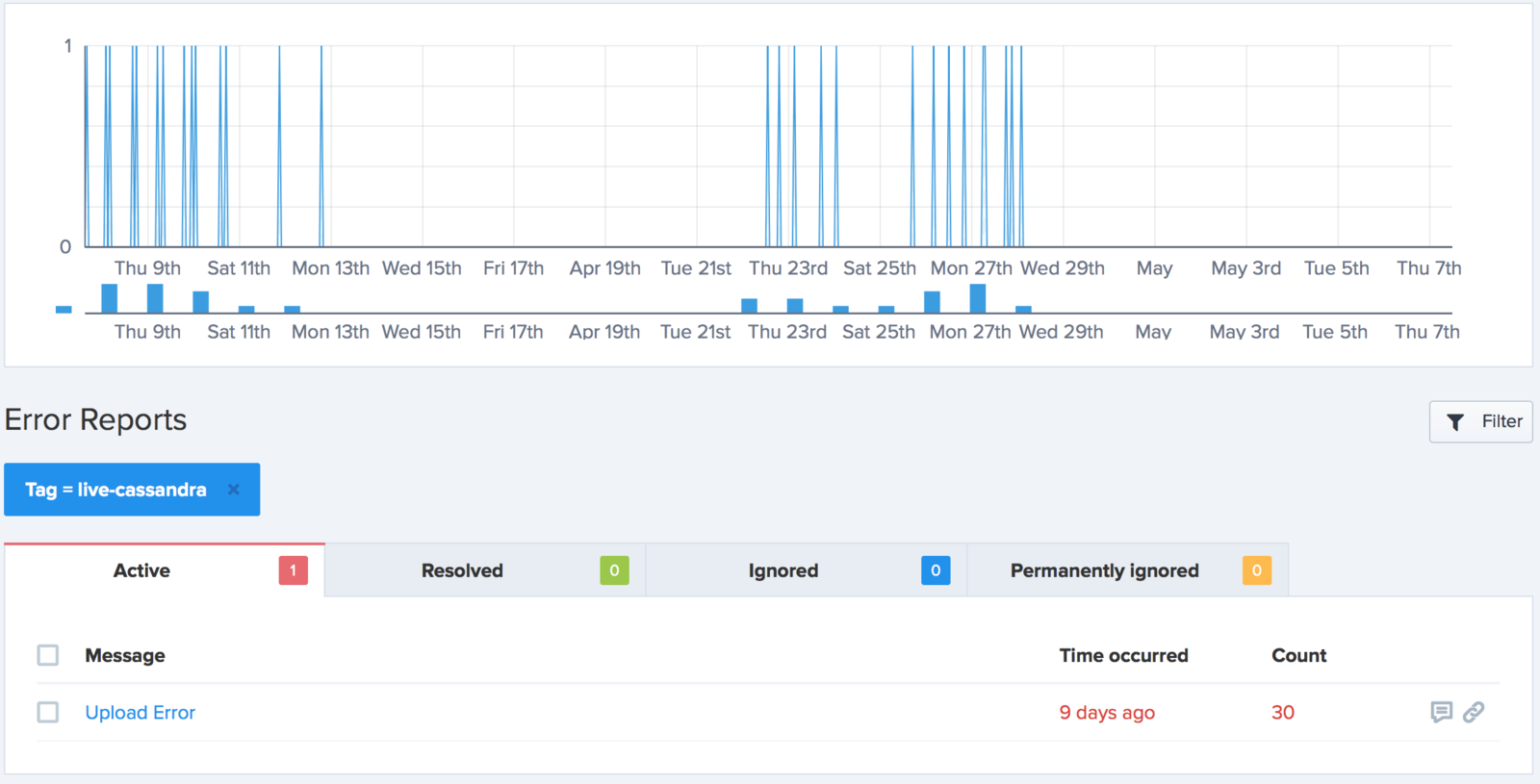
How we collect user error

Raygun
Raygun
- Default:
User Agent, Host, Referer
-
Version, Tag
-
Tracking User
- Customer Data
- Filtering
